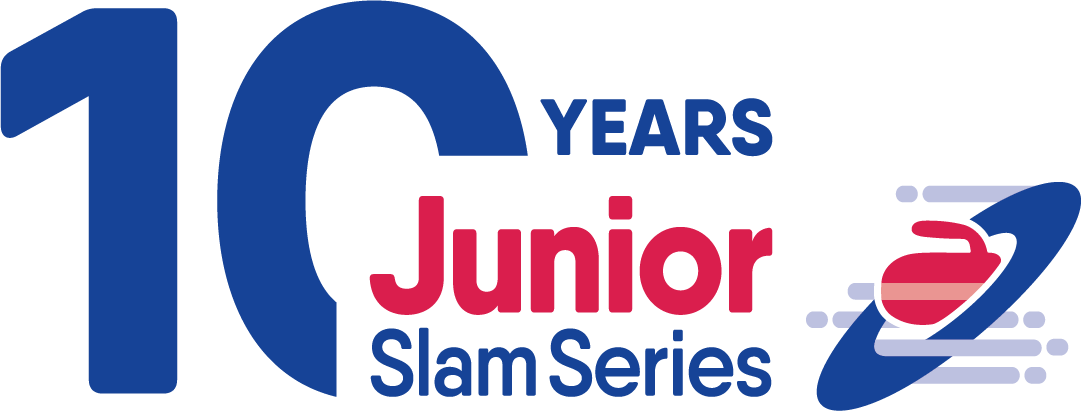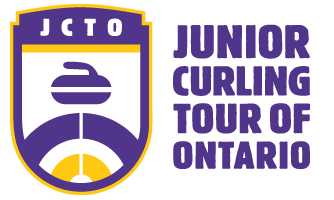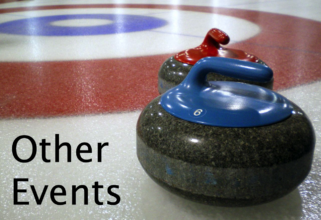Rules & Guidelines
Competition Guidelines
Junior Slams are self-regulating competitions. Athletes and coaches must guide themselves according to the standards outlined in the following competition guidelines.
Before teams are permitted to play, convenors will check to ensure all teams have:
- Read the Concussion Guidelines and Return to Play Policy
- Read the Junior Slam Series Anti-Bullying and Unwanted Behaviour Policy
- Read the Sweeping Statement
- Read the Spirit of Curling
- Read the Payment, Waiting Lists, Cancellations and Refund Policy
- Reviewed Curling Canada’s Rules of Curling for General Play
- Reviewed the Event information for the relevant Slam they are competing in
- Signed and submitted a Participation Agreement Waiver
The Junior Slam Series takes the health and safety of the participants in our events as our number one priority. As part of this policy, all Junior Slam Series events follow the world standard concussion protocol and return to play policy. In addition, Ontario legislation, entitled “Rowan’s Law” requires that all athletes, guardians and coaches review the concussion awareness training at least once per year. Links to the training materials can be found in the Rowan’s Law section on this page. As part of complying with Rowan’s Law a second page has been added to our season waiver that must be signed by ALL guardians, athletes and coaches prior to participating in any of our events.
Any athlete who, at any of our events, is involved in or is a witness to an incident as described in this protocol is required to immediately report the incident to the event convenor. That convenor will assess the risk of concussion, and, if necessary recommend additional assessment. They will also file an incident report.
Any athlete who is involved in an incident, prior to a Junior Slam series event, where a concussion is diagnosed, will be required to provide a doctors note that certifies that they have followed the 5-step process outlined in the protocol and have proof that they have received medical clearance to return to play.
The Junior Slam Series convenor has the ability to file an incident report at any of our events.
The Junior Slam Series has a zero tolerance policy for bullying. This applies to athletes, coaches, parents and spectators attending and participating in a Slam event. Every team is responsible for the behaviour of the individuals in its group. For example, if a parent contravenes this policy, it applies to the entire team. This policy applies to behaviour at a Slam as well as to cyber/online references to Junior Slam Series competitions and participants.
Failure to comply with this policy may result in removal from the Slam competition and/or from all future Slams in the curling season and competition fees will not be refunded. Interpretation of this policy is at the discretion of Junior Slam Series. Zero tolerance means one infraction may result in disciplinary action.
Bullying and Unwanted Behaviour Policy
At the Junior Slam Series, we are committed to creating a competitive environment that is safe, respectful, and developmentally appropriate for all participants — including athletes, coaches, officials, volunteers, and spectators. Our goal is to foster high-performance growth rooted in sportsmanship, integrity, and mutual respect.
Bullying is defined as any intentional or repeated behaviour — physical, verbal, psychological, social, or digital — that causes harm, distress, intimidation, or exclusion to another individual or group. Bullying may occur in-person or online, and can involve one or multiple individuals, whether acting directly or passively. It is also important to note that any unwanted behaviour that causes someone to feel targeted, unsafe, or humiliated may be considered bullying, regardless of whether it was intended as “just a joke” or competitive intensity.
In a curling context, bullying and other inappropriate conduct may include (but is not limited to):
-
Using one’s body or brush to deliberately obstruct an opponent’s view or path of delivery;
-
Taunting, name-calling, or mocking athletes in locker rooms or off-ice spaces;
-
Spectators or coaches verbally confronting or intimidating other attendees;
-
Athletes or coaches threatening, insulting, or dismissing convenors or volunteers;
-
Sending disrespectful, intimidating, or harassing messages through social media or text;
-
Coaches belittling athletes in a way that causes emotional distress;
-
Spectators harassing club staff such as kitchen teams or ice makers.
On-Ice Conduct and Celebratory Behaviour
We also ask all participants to be mindful of excessive celebrations, theatrical reactions, or “grandstanding” behaviours that may be common in other sports but are not aligned with the values of curling. While we celebrate passion and joy, gestures that are intended to draw attention, embarrass opponents, or shift focus away from team performance to individual display are discouraged.
Examples of unacceptable celebratory conduct include:
-
Yelling, fist-pumping toward opponents after a missed shot;
-
Prolonged shouting, dancing, or over-the-top celebrations that disrupt the flow of play;
-
Overly dramatic gestures that appear meant to taunt or show up other teams.
At the Junior Slam Series, we believe there is a difference between expressing joy and undermining respect. Our standard is not to suppress enthusiasm, but to channel it in ways that uplift your team and honour your opponents. Respectful celebrations are part of the game. But curling remains a sport grounded in humility, honour, and grace — especially in moments of victory.
Reporting and Accountability
All participants — athletes, coaches, parents, volunteers, and spectators — have a duty to report incidents of bullying, harassment, or inappropriate conduct to Junior Slam Series staff. Reports will be handled with confidentiality, care, and urgency.
We acknowledge that bullying is more likely to occur in high-pressure and emotionally charged environments. While the drive to win is an important part of athlete growth, we remain committed to creating competitions that are first and foremost safe, developmental, and inclusive. These values define who we are and what kind of champions we aim to build — on and off the ice.
Except where noted below, Junior Slam Series events follow Curling Canada’s Rules of Curling for General Play. In addition all teams must follow the World Curling Federation standard for brushes and sweeping. Any clarification or interpretation of the afore mentioned rules is at the sole discretion of the event convenor.
These following details supersede the above rules for Junior Slam Series events.
Pre-Game Practice
Each team will get a pre-game practice, with the first practice commencing 20 minutes before the scheduled game time
- the team on the top of scoreboard has first practice
- 1 minute to cool slider. 7 minutes to practice after which the team has 2 minutes to complete two last stone draws (LSD)
- the last stone draw is delivered towards the glass
- each team throws both the clockwise and counter-clockwise rotations, commencing with the clockwise rotation first
- every player from the team throws a minimum if 2 LSDs, one each turn, with sweeping
- measurement of the LSD can be observed by any opposition player
- in the case of an LSD covering the pin or failing to reach the house, a shooter not throwing one of the two LSDs, will throw an LSD distance to break a potential tie and determine hammer
Game Duration
Games are schedule to be 2h 30m in duration
- no-new end may start after 2h 10m from the time hammer is determined
- play 8 full ends unless a team chooses to concede or is mathematically eliminated
- if required, a single extra end is played back towards the glass, each team is allowed a single interaction in the extra end regardless of how many interactions they did or didn’t use during regular play
- if tied after an extra end, one player from each team delivers a draw to determine the winner
- there is no mid-game break
Coach Interactions
JSS follows Curling Canada’s Enhanced Coaching Interactions guidelines
Generally
- interactions must be called by the team when in charge of the house
- both coaches may visit their teams during the interaction but once the team in charge of the house completes the interaction, both coaches must return to the back of the sheet and the interaction is over
- coaches must take the interaction from the boards or behind the back line
- please wait for both coaches to be present before commencing the interaction
- visual aids (Curl Coach, Paper Notes, Strategy Board) may be used only to confirm the situation at the far end of the sheet and as a reference for the discussion.
- U15 events, 1 – 60 sec interaction per end, with a max of 1 min conversation with the team between ends
- U18 events, 1 – 60 sec interaction per end, with a max of 1 min conversation with the team between ends
- U20 events, 2 – 60 sec interactions in the first half of the game and 2 – 60 sec interactions in the second half of the game, with a max of 1 min conversation with the team between ends
- MD events, 2 – 60 sec interactions in the first half of the game and 2 – 60 sec interactions in the second half of the game, with a max of 1 min conversation with the team between ends
If you need a fair play timeout, technical timeout or rule explanation / etc. please ask the convenor to handle the interaction with/for you.
Playoff Games
During playoff games, the following rule changes apply
- the team with a clear higher record by W/L in the round robin standings has BOTH hammer and choice of stone colour
- for teams that are tied by W/L record and sorted by lower LSD score, the higher seeded team will have choice of hammer OR stone colour
- the higher seeded team must declare their preference at least 10 minutes prior to the first practice and will have first practice
- the lower seeded team has second practice
- the practice is 1 minute to cool sliders followed by a 5 minutes practice
- there is no draw for hammer
All other rules with respect to game duration and timeouts remain unchanged.
Conduct
All athletes are expected to demonstrate respectful, sportsmanlike behavior on and off the ice. The following conduct guidelines will be monitored throughout the event:
Hog-Line Violation Awareness: Athletes must make every effort to release the stone before the hog line. Repeated violations, whether intentional or due to technique, will be addressed by officials or convenors.
Respectful Emotional Control: Broom slamming, use of foul language, or displays of uncontrolled frustration will not be tolerated. Players are expected to manage emotions in a manner that reflects the spirit of curling.
Proper Sweeping Technique: Deliberate dumping during sweeping (dropping or forcing excessive debris onto the ice surface) is considered unsportsmanlike and may result in disciplinary action.
The following rules detail specific rules for Junior Slam Series Mixed Doubles events.
Stone Rotation
For each game 2 pre-determined stones will be set aside as position stone rocks. The team then has the ability to choose 5 of the 6 other rocks to use during the game.
The team’s spare (6th) stone may be switched into play after the completion of each end.
In playoff games, each team designates their pre-positioned stones at the end of their practice. They play with the other 5 stones and a spare stone.
Pre-Game Practice
The teams may practice with all 8 stones of their designated colour. Two “positioned” stones of each colour will be pre-determined for each round robin draw.
At the end of the 5 minute practice time, each player delivers one stone to the pin at the home end; the first stone with a clockwise rotation, and the second stone with a counter-clockwise rotation. The team with the lower combined distance earns the choice of hammer in the first end. If a team covers the pin or fails to reach the house a second stone will be thrown by either player on either path to the house to achieve an LSD measure to break a potential tie.
Game Duration
Games are schedule to be 1h 45m in duration
- no-new end may start after 1h 30m from the time hammer is determined
Power Play
Once per game, each team (when that team holds the hammer in that end) can use their “Power Play”. The in-house stone, which belongs to the team with hammer, is placed on either side of the house with the back edge of the stone touching the tee line, at the point where the 8-foot and 12-foot circles meet. The guard stone is positioned to the same side of the sheet, the same distance that was determined for the centre guards.
Age Restrictions
In general players must be the correct age for the event according to Curling Canada standards For example all members of a U18 team must be 17 years of age or younger on or before June 30.
Team Makeup
For U18 & U20 events, all teams are single gender. U15 teams are open and may be any combination of players. Mixed Doubles teams require one player of each gender.
No spares/alternates are allowed in Mixed Doubles. Mixed Doubles teams are earning points in a qualification process. Any change in lineup before the event begins constitutes a new team. Changes in lineup during an event are not allowed in Mixed Doubles events.
On September 16, 2016, The World Curling Federation issued a statement on rules, specifications and policies for sweeping techniques and brush technology for elite curling. Herewith, all teams participating in the Junior Slam Series must abide by the World Curling Federation (WCF) standard for brushes and sweeping. This applies to all Slams in our series with NO exceptions.
Most equipment manufacturers have a full supply of approved brush heads in stock.
The Junior Slam Series introduced the Junior Team Ranking System (JTRS) for U15, U18, and U20. All teams that compete in a Junior Slam Series event automatically earn JTRS points in the age category of that event. The JTRS points are used to invite teams to “Invitational Events” offered by the JSS. Provincial points systems are available for qualification to the various Provincial Association events. i.e Ontario’s TTRS system.
For our Mixed Doubles events we have created the MDTRS system which is based on field size.
The Junior Slam Series introduced the Junior Team Ranking System (JTRS) for U15, U18, and U20. All teams that compete in a Junior Slam Series event automatically earn JTRS points in the age category of that event. The JTRS points are used to invite teams to “Invitational Events” offered by the JSS. Provincial points systems are available for qualification to the various Provincial Association events. i.e Ontario’s TTRS system.
For our Mixed Doubles events we have created the MDTRS system which is based on field size. This system will be used for our qualification events as in our Players Championship or exchange opportunities
Junior Slam Series events adhere to the Spirit of Curling. The Spirit of Curling is a commonly used term that refers to the respect curlers show, not only to one another, but also to the sport itself. It is encapsulated by the principle that a curler would rather lose than win unfairly. Respect is one of the fundamental principles which underpin the Spirit of Curling. Slam competitors are expected to uphold the spirit of curling on, and off the ice. The Spirit of Curling generally sees no player attempt to gain an advantage in the game through any malice, whether by breaking the rules, distracting opponents or acting in an unsporting manner, which would effectively disadvantage their opponents. It is expected that if a player should do so then they admit to their fault. Broom slamming, profanity and unsportsmanlike behaviour are not acceptable.
The Spirit of Curling demands good sportsmanship, kindly feeling and honourable conduct among coaches and spectators too. This spirit should influence both the interpretation and application of the rules of the game and also the conduct of all participants on and off the ice.
The Spirit of Curling plays a crucial role in Slams, where there are no referees or officials, however Slam conveners will keep events running smoothly and help to iron out any concerns. Rules are based on the Spirit of Curling and every curler should adhere to this etiquette when playing.
– this information courtesy of the World Curling Federation.
Payments
Teams that register for a Slam are not officially “confimed” until we receive full payment. Payment instructions are auto-emailed to you when you register. We accept payment by e-transfer. Teams from outside Canada must contact us at info@uniorslamseries.com to learn about our foreign payment process. We use PayPal for all foreign team entries. You can pay for all of your Slams with one payment. Simply add the total (must include HST). In your e-transfer notes. Once we receive payment, we confirm that you have been accepted into the Slam.
Waiting Lists
If you are trying to register for a Slam and it is full, you can purchase a waiting list ticket. Should another team cancel, we will the offer spot to teams on the waiting list, the cost of the waiting list ticket is applied to the fees for that Slam. If no spot becomes available we will refund 100% of the cost of the waiting list ticket.
If you have not been offered a spot in the Slam you may cancel a waiting list ticket (and receive a full refund) at any time. Simply email us at payments@juniorslamseries.com to notify us of your desire to cancel the ticket. If there are no waiting list tickets available and you wish to be added to the waiting list, please contact us at info@juniorslamseries.com and we can make additional waiting list tickets available to you.
Cancellation and Refunds
If your team is granted a final confirmed entry into a Slam and you have to cancel, you must notify us by email at info@juniorslamseries.com We offer a ‘sliding’ cancellation/refund policy as follows:
Cancel up to 28 days prior to the Slam:
- If we have a replacement team waiting, a full refund is given.
- If NO replacement team waiting, a cancellation fee of $100 applies.
Cancel 28-14 days prior to the Slam:
- If we have a replacement team waiting, a $100 cancellation fee applies
- If NO replacement team waiting, we refund 50% of your Slam fee.
Cancel 14 days prior to the Slam:
- If we have a replacement team waiting, we refund 50% of your Slam fee.
- If NO replacement team waiting, there is NO refund.
Junior Slam Series recognizes there may be extenuating and unforeseen circumstances. We reserve the right to consider cancellation requests on a case by case basis. Teams should plan carefully. Avoid double booking events on the circuit where qualification for one requires cancellation of a Slam. Leave space between events for rest and practice.
Every member of the team must review the full competition guidelines & sign a waiver (athletes, or athlete’s parent/guardians and the coach). Once every team member has signed, waivers can be scanned and emailed to waivers@juniorslamseries.com. Please email us ALL the signed waivers for every member of your team together under one email. Alternatively, you may sign the waivers and bring them to your first Slam. Teams will not be permitted to play without ALL the athletes and coach signing and submitting this waiver.
Important: The Concussion Code of Conduct is different for Coach and Athletes. Make sure you download the correct version, sign and date BOTH the waiver and Concussion Code of Conduct.
Rowan's Law Resources
Rowan’s Law requires that all Athlete’s under the age of 25, and (in the case of Athletes under the age of 18, ALL of their legal guardians, review the training materials at least once per year.
The current training materials can be found by clicking on the following links.
After you have reviewed the appropriate booklet, you must complete and sign the ‘Code of Conduct’ form that is included with the Junior Slam Series waiver.
For more information on Rowan’s Law please visit: ontario.ca/concussions



